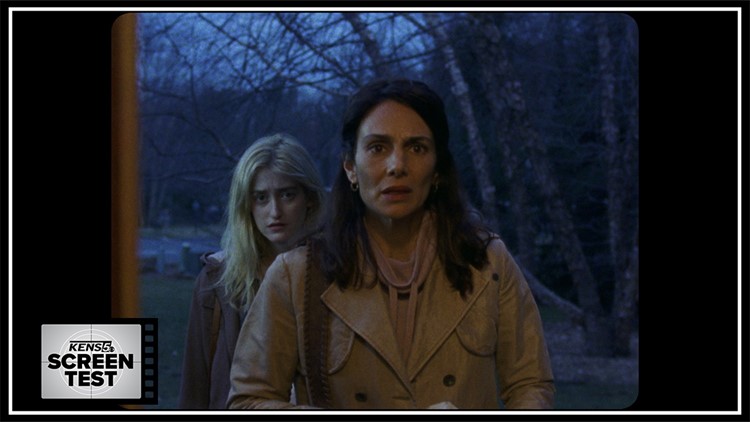TEXAS, USA — So much attention is paid to the prodigy-level directorial debut – the “Aftersuns,” “Return to Seouls” and “We’re All Going to the World’s Fairs” of the world – that we run the risk of overlooking introductory efforts heralding names to pay close attention to even if they don’t kick off their filmographies with a masterwork.
Such is the case with Theodore Schaefer and “Giving Birth to a Butterfly,” a 77-minute fable as strangely tender as its title suggests, even if the ultimate catharsis isn’t as finely shaped as the immense sadness that defines the journey there. Strolling along on the sliding scale of strangeness somewhere between Yorgos Lanthimos and Josephine Decker, Schaefer has made a surreal movie about suburban malaise that might have been probing for some meaning itself if it didn’t deploy the self-awareness that some of its more hopeless characters couldn’t dream of wielding.
Case in point: Paul Sparks’s dolt of a dad Daryl, who proclaims “Even better!” after his son introduces his pregnant girlfriend Marlene (Gus Birney) to the family and clarifies the baby isn’t his. Daryl is too preoccupied with aspirations of opening a fast-food joint that he can’t bother to think things through without speaking, but his case of disillusionment is hardly the most acute in a neighborhood where metaphorical cages range from the entrepreneurial and domestic to the artistic and just plain obtuse. Only Daryl’s wife Diana (Annie Parisse) emerges as a figure aware of the waking-nightmare reality that defines the proceedings, at least initially—and Parisse’s performance is beautifully calibrated to a character who can’t decide if she wants out or simply wants to get by.
At first blush, “Giving Birth to a Butterfly” faces a similar struggle. Without much of a jumping-off point to speak of, we must quickly adjust to a place and time where an inability to discern what anyone wants in the face of what they have creates a sense of uneasiness (and, in at least one scene, skin-crawling tension). Is this an experiment in mood first and foremost, or are we expected to be moved when Marlene returns home to find her own mother lost beyond recognition to showmanship dreams that will never pass?
Suffice to say, that parental alienation draws Marlene closer to Diana. When the latter finds out her identity has been stolen, the two eventually take their common ground on the road—and on the path to more assured filmmaking from Schaefer. If the grade-A weirdness of the movie’s first half keeps a kaleidoscopic exploration of maternal figures simmering under the surface, potent injections of pathos helps the second bloom into a clearer – albeit no less oddball – vision about confessions and reckonings.
Schaefer has a compelling visual sensibility, too, that helps buttress against flatter moments when characters talk about “Simpsons” characters and mythic Greek heroes in the same sentence, a scene that feigns for cosmic profundity but stumbles in execution. A square-Polaroid aspect ratio emphasizes the cages our characters are trapped in while Matt Clegg’s grainy cinematography further drives home that they’re running out of time faster than they realize. Most striking is the movie’s catalog of images shot through or against reflective surfaces, a motif perhaps speaking to the idea that everyone in “Giving Birth to a Butterfly” could stand to examine themselves a little bit closer.
The final stretch of “Giving Birth to a Butterfly” sees planes of reality fully breaking down, revealing the movie at both its most immediately captivating, its most narratively obscure and its most emotionally meaty; it ultimately comes to make total sense that Schaefer served as a producer on Jane Schoenbrun’s “We’re All Going to the World’s Fair,” a similarly alluring work whose meaning reveals itself deep in your gut before anywhere else. If “Giving Birth to a Butterfly” finds Schaefer in his own storytelling metamorphosis, it’s worth awaiting what he has to offer once fully emerged.
"Giving Birth to a Butterfly" is not rated. It's now streaming on Fandor. Runtime: 1 hour, 17 minutes.
Starring Annie Parisse, Gus Birney, Rachel Resheff, Judith Roberts
Directed by Theodore Schaefer; written by Schaefer and Patrick Lawler
2023
---
MORE REVIEWS:



